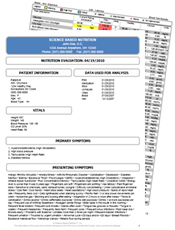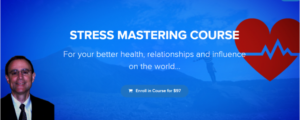IS IT HOLDING YOU BACK?
Imagine, that you are sitting in a restaurant. At some point during the meal, you notice that your heart is beating faster than normal and that there is a slight pressure in your chest. You feel like you are having difficulty getting a breath in and you also notice that the lights in the restaurant are starting to bother you. You begin to hear every noise around you- a child clinking his silverware against his glass, the waiter writing down an order and conversations becoming increasingly louder. Suddenly, the restaurant feels overwhelming and small. At which point you may feel a tingling

sensation down your arms or your stomach cramping. You may be thinking, is this a heart attack? Why can’t I get a deep breath? Why is it so loud in here? What’s happening to me?
Chances are, if you have experienced any parts of the scenario listed above – You’ve had a panic attack. Panic attacks can occur anywhere and at any time. A panic attack is often classified as feeling profound moments of anxiety that can present themselves in physical symptoms or feeling of doom. (1) They typically last for about 10 minutes but can take a few minutes to hours to calm down.
Anxiety enlists the body’s natural “fight or flight” response. This type of innate response kicks in when we perceive a harmful event or threat to our survival. The body will produce a flood of hormones to help
enhance our speed, heart rate, reflexes and circulation. (2) Anxiety can also tap into this “fight or flight” system. This can help explain for example why we may feel “nervous or anxious” before giving a speech in public or before flying. In order to be diagnosed with an anxiety disorder, the symptoms must persist for months. According to the Anxiety and Depression Association of America, around 40 million adults age 18 and above have an anxiety based mental illness. That is nearly 18 percent of our population. (3) There are seven common types of anxiety disorders: generalized anxiety disorder (GAD), phobias, social anxiety disorder, post-traumatic stress disorder (PTSD), panic disorder, obsessive-compulsive disorder (OCD) and separation anxiety disorder. (3)
Anxiety can present itself in a variety of different symptoms and forms. Much like the restaurant scenario, it can be an emotional and or a physical response.
The emotional response can include but is not limited to the following examples (3):
- Restlessness
- Feelings of apprehension
- Feelings of danger
- Anticipating the worst
- Trouble with concentration or mind goes blank
- Feeling irritable
Some examples of physical responses to anxiety (3):
- Increase in heart rate
- Sweating
- Headaches
- Upset stomach
- Shortness of breath
- Muscle tension
What could you do to help reduce anxiety?
- Optimize your gut flora. The gut and the brain work together and can influence one another. A study was conducted on mice with infectious colitis and the use of a probiotic Bifidobacterium Longum. Anxiety like behavior was assessed and during the study, the mice that had received the probiotic had a reduction in anxiety symptoms. In fact, the study found an anxiolytic (inhibits anxiety) effect of the probiotic involving the vagal pathways of the gut-brain communication. (4)
- Supplement with omega 3 fats EPA and DHA. A 12-week study including 68 medical students, provided blood samples to be analyzed on low stress days and on days leading up to an exam. The randomized controlled trail had students receive either a placebo or supplemented with omega 3s. The group supplementing with omega 3s had a 20% reduction of anxiety symptoms as well as a 14% reduction inflammation. This data suggests that there is potential to help individuals with anxiety disorders. (5)
- Running or walking can help improve symptoms of anxiety by releasing hormones such as serotonin and norepinephrine. This phenomenon is known as the “runners high” post workout. A review conducted by the Journal of Psychiatry & Neuroscience concludes that exercise can work like an antidepressant and can also help promote growth of brain neurons. (6)
- Eat a well-balanced diet. Your body needs the proper fuel to support its functions. Eating foods that are processed (artificial and sugary) reduces the body’s ability to properly function. It would be equivalent to putting the wrong gas into your car. It may function for a little bit, but over time it damages the engine.
- Take a deep breath. If you find yourself feeling anxious or in a panic attack, try focusing on your breathing. This will help if you find yourself in a hyperventilation situation. Take a deep breath in through your nose for at least 5 seconds. This should be felt in the chest and abdomen, then slowly exhale out of your mouth. Depending on the level of anxiety, this may take a few minutes before feeling calmer. (3) In addition, practice more the HeartMath techniques Dr. Ventola introduces in his practice. For more detailed instruction engage in his Stress Mastering Course at tinyurl.com/Stress Mastering Course (3)
- Reduce time on electronic devices. The usage of electronic devices has increased dramatically over the last 5 to 10 years. Electronic devices used before bedtime have the potential to reduce the production of melatonin. Melatonin is needed to help regulate our sleep wake cycle. Without it, we may have trouble falling or staying asleep. Lack of sleep can elevate stress and anxiety within the body.
It is important to discover what vitamins and minerals you need in order to alleviate stress so that you can live a life of optimal health. Dr. Ventola can help get you on the right track with individualized lifestyle, dietary and supplement guidelines based on your blood test results.
Works Cited:
- Shaikh, Faiq. “How Long Do Anxiety Attacks Last?” Can Anxiety Cause Weight Gain?, 2018, www.calmclinic.com/anxiety/attacks/how-long-anxiety-attacks-last.
- “Anxiety in Your Brain: What Happens When Anxiety Attacks?” com, Mercola.com, articles.mercola.com/sites/articles/archive/2013/12/05/anxiety.aspx.
- “Everything You Need to Know About Anxiety.” com, Mercola.com, articles.mercola.com/anxiety.aspx.
- Neurogastroenterol Motil. 2011 Dec;23(12):1132-9.
- Brain Behav Immun. 2011 Nov;25(8):1725-34. doi: 10.1016/j.bbi.2011.07.229. Epub 2011 Jul 19.
- “Dietary Fiber Consumption Can Impact Your Brain.” Mercola.com, Mercola.com, articles.mercola.com/sites/articles/archive/2018/11/01/omega-3-for-anxiety.aspx.
References for this newsletter as well as previous newsletters may be found on our website. The information has not been evaluated by the FDA and is not intended to treat, cure, or prevent any disease.




